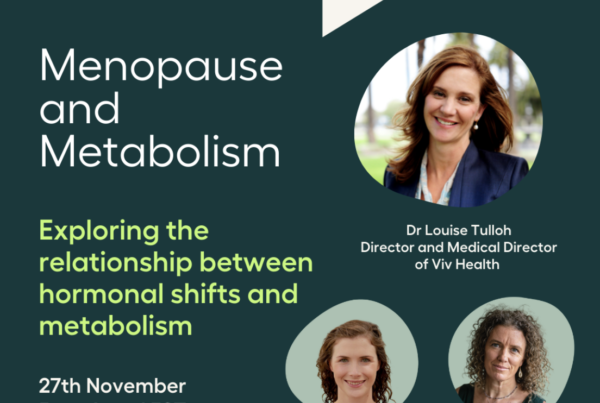Menopause and ageing can present some challenges to your metabolism
When women think of metabolism, their mind often goes straight to their weight. But metabolism is really the way our body’s biochemical processes deal with energy. Metabolic messages are delivered by hormones including insulin, cortisol, thyroid hormone, leptin, oestrogen, progesterone and testosterone among others. Our metabolism is also influenced by our genetics and family history, even the metabolic health of our mother when we were in the womb.
Our body’s ability to manage energy intake in the form of calories becomes less efficient as we age. It can also become overwhelmed by the type of calories we eat, our physical fitness, our muscle mass and other health conditions.
Our modern lifestyle also presents challenges when it comes to maintaining optimal metabolic health. We have become less active, sitting at computers for work and leisure, we need to do less physical work around the house and garden as we might outsource these tasks, exercise is limited to bursts at the gym rather than low levels of physical activity happening right through the day. Our food environment contains a ready availability of cheap, processed foods which cause rapid blood sugar rises rather than a slow steady increase which is easier for it to manage.
Once food is absorbed by our gut, it is broken down. Carbohydrates we eat break down into sugars, and are absorbed into the blood. Rising blood sugar triggers your pancreas to release the hormone insulin and insulin in turn facilitates the delivery of blood sugar into muscle and liver cells where it can be stored for later energy requirements. If there is an excess energy supply, insulin is very good at storing it for later in the form of fat tissue. This is its role and it protects us during periods of starvation (although most of us are surrounded by abundance, not famine).
With increasing age, persisting high levels of blood sugar, low levels of physical activity, and falling oestrogen at menopause, our cells become somewhat insulin resistant. This means that our pancreas needs to pump out additional insulin to force the sugar into cells where it can be used for energy.
Rising levels of insulin and increasing insulin resistance have other negative effects on our health. Insulin resistance is associated with high blood pressure, high cholesterol, unhealthy blood lipids, elevated fasting blood sugar, and redistribution of fat storage to our midsection. It is thought that insulin resistance is the main driver of many of our chronic diseases including heart disease, many cancers, dementia and type 2 diabetes.
Metabolism is a very complex process. The first step in restoring or maintaining optimal metabolism is to address lifestyle factors.
The food you eat
To maintain steady levels of blood sugar it is preferable to eat foods that are broken down slowly or do not impact blood sugar at all. These foods include lots of vegetables, most fruits, complex grains in their non-processed form, healthy fats and protein foods like meat. Highly processed foods including sugar are readily absorbed into the bloodstream causing a rapid rise in blood sugar, a rapid insulin response, a sudden fall in blood sugar and consequently increased hunger. This blood sugar- hunger cycle drives poor eating patterns.
The timing of food consumption is also relevant for some people with the creation of stretches of fasting, so called intermittent fasting eating patterns, allowing your body to use its own fat stores for energy, promoting metabolic flexibility. It may also be relevant how you eat, the environment you spend eating, whether you rush, whether you are stressed, as your stress hormones also impact your blood sugar level.
Midlife women can also drink more alcohol than is recommended or healthy. Alcohol contains empty calories, loosens your inhibitions or control over your eating choices, increases appetite and impairs sleep thereby having many potential negative effects on your metabolism. Irritability and mood swings common during perimenopause may encourage women to use alcohol as a means of self-soothing. Unfortunately, alcohol is also associated with increased hot flashes and exacerbating sleep disturbance.
Physical activity
Your muscles are a powerhouse when it comes to storing excess sugar and using it up later. Having large muscles by doing some form of resistance training whether it is heavy manual work, pushing weights even doing yoga and Pilates, will increase your metabolic health. When you are exercising with some huff and puff, you improve metabolic pathways and are able to move blood sugar into your cells without the help of insulin, so called insulin independent glucose transfer. In addition ,regular physical activity increases your caloric demands so you burn more fuel.
Sleep and stress
Research shows that poor quality sleep and insufficient sleep duration lead to impaired metabolic health and an increase risk of chronic disease. Whilst the mechanisms for this are not entirely known, levels of cortisol, your stress hormone, are increased with inadequate sleep and are associated with weight gain and insulin resistance.
Chronic levels of emotional or psychological stress also raise cortisol levels and impair optimal metabolism.
Hormones
Most women can attest to the experience of changing appetite throughout the menstrual cycle. Appetite is generally increased in the week before the periods starts, the late luteal phase. This is a result of your sex hormone levels.
Women often hope that replacing oestrogen in the form of HRT will help them lose weight but unfortunately it is not that simple. Research suggests that ageing itself is the main driver of increased weight through midlife for both men and women and that the main impact of menopausal hormone change is to shift where women store their fat tissue, moving it more to their waist, so called shape shifting.
Testosterone is a hormone that women have in more abundance than oestrogen and progesterone, even though it is considered the male hormone (men have 10 to 20 times more testosterone than women do). Women with polycystic ovary syndrome (PCOS) have relatively higher levels of androgens including testosterone. This is associated with insulin resistance in a complex fashion. It seems the sweet spot for the impact of testosterone on metabolism is different for males and females. Also, many women do not find ketogenic diets or fasting protocols for weight loss as effective as many men do. The reason for this is not clear but may be our different hormones.
Diagnosing insulin resistance
If you have a family history of type 2 diabetes or have features of metabolic syndrome (high blood pressure, abnormal blood lipids, waist circumference over 88 centimetres), then it would be helpful to explore your level of insulin resistance. Your doctor can order a blood test called a glucose tolerance test. This test measures your blood insulin and glucose response over 2 hours after a drink containing a high dose of glucose. Fasting blood sugar level can also give an indication of insulin resistance but this will be a later indicator.
Metabolic health occurs along a continuum, you can go from insulin resistance to insulin sensitivity with lifestyle factors alone (diet, exercise and sleep). If lifestyle factors are not improving your metabolic health, your doctor may prescribe certain medications. Whilst it would be fantastic if there was a miracle cure to weight loss and improve metabolic health, all medications only work on small areas of your entire and complex metabolic system and as such you cannot avoid addressing your lifestyle factors.
Working on your metabolic health will pay great dividends – better energy, improved mood, and less risk of developing chronic disease.






